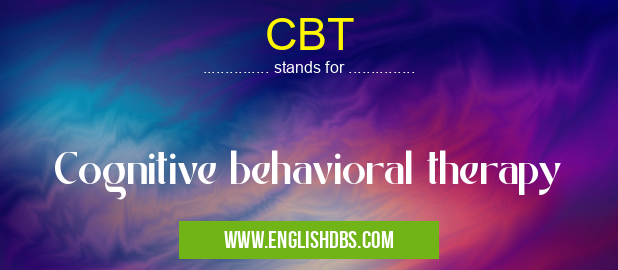What does CBT mean in REHABILITATION
Cognitive behavioral therapy (CBT) is an evidence-based therapeutic approach used to treat a variety of mental health conditions. It works by helping individuals identify and address problematic thought patterns, behaviors, and emotions that can impact overall wellbeing. CBT focuses on reframing negative thoughts and developing healthier coping strategies in order to help individuals live the life they want to live.

CBT meaning in Rehabilitation in Medical
CBT mostly used in an acronym Rehabilitation in Category Medical that means Cognitive behavioral therapy
Shorthand: CBT,
Full Form: Cognitive behavioral therapy
For more information of "Cognitive behavioral therapy", see the section below.
Essential Questions and Answers on Cognitive behavioral therapy in "MEDICAL»REHABILITATION"
What is Cognitive Behavioral Therapy (CBT)?
Cognitive behavioral therapy (CBT) is a type of psychotherapy which seeks to help individuals modify their thoughts, beliefs, and behaviors in order to improve the quality of their life. CBT helps individuals identify patterns of thinking that may be influencing negative emotions or behaviors, enabling them to gain insight and learn more adaptive coping skills.
How does CBT work?
CBT is an evidence-based approach that works by helping individuals modify negative thought processes and develop more effective coping strategies when faced with challenging situations. CBT is usually conducted through a series of meetings with a therapist, where you will be encouraged to explore your beliefs about yourself and others, discuss difficult events from the past and present, practice new skills for managing emotions and challenging situations, among other types of activities.
What are some common techniques used in Cognitive Behavioral Therapy?
Common techniques used in Cognitive Behavioral Therapy include cognitive restructuring, emotional regulation, problem-solving skills development, guided discovery, role-playing exercises and exposure therapy. These techniques can help clients gain insight into dysfunctional thought patterns as well as develop healthier ways of responding to triggers or stressors.
What are the benefits of using Cognitive Behavioral Therapy?
Research has shown that Cognitive Behavioural Therapy has been proven to be especially effective at treating depression, anxiety disorders and trauma-related issues such as PTSD. Other reported benefits include increased self-awareness, improved problem-solving skills, improved communication style and better management of emotions both during sessions with the therapist but also in everyday life.
Is there any difference between counseling and cognitive behavioral therapy?
Counseling focuses on providing support as clients process emotional issues from the past while providing guidance for making changes in the present situation. On the other hand, cognitive behavioural therapy focuses on identifying unhelpful thoughts or behaviours which might be evoking undesirable emotions or stemming from irrational core beliefs one might have developed throughout their lifetime.
Who can benefit from Cognitive Behavioral Therapy?
Cognitive behavioral therapy can be beneficial for many mental health issues including depression, anxiety disorders phobias, panic disorder personality disorder obsessive compulsive disorder trauma related issues such as posttraumatic stress disorder grief anger management relationship difficulties chronic pain chronic fatigue syndrome substance use disorder and adjustment issues.
How long does it take to complete cognitive behavioural therapy (CBT) treatment?
The length of time required for successful completion of treatment with CBT can vary depending on individual goals set during therapy sessions as well as people's motivation levels and willingness to try new things. Generally speaking it takes between 6 to 20 sessions spread over several months for most patients who receive CBT treatment.
How do I know if my therapist practices cognitive behavioural therapy (CBT)?
The best way to find out if your therapist practices CBT is by asking them directly about their training background and experience with this form of psychotherapy specifically. Most therapists who practice CBT would have completed extensive training in this type of therapy so they should have no problem talking about it if asked directly.
What should I expect during my first session with a cognitive behavioral therapist?  ​                                                                                                                                              Â
During your first session with a cognitive behavioral therapist you can expect them to ask questions about you such as why you think you need help what worries concerns or goals you have; what has already been tried; previous health problems; family history; use of drugs alcohol or substances; current lifestyle habits etc The information gathered will help your therapist assess how they can assist you.
Final Words:
In conclusion, cognitive behavioral therapy is a beneficial treatment approach for a variety of mental health issues because it helps people understand the relationship between their thoughts and actions while teaching them how to manage difficult feelings with healthy coping mechanisms instead of relying on potentially destructive behavior or inaction. Ultimately it provides individuals with the practical tools needed for sustained mental well-being in all areas of life.
CBT also stands for: |
|
| All stands for CBT |
